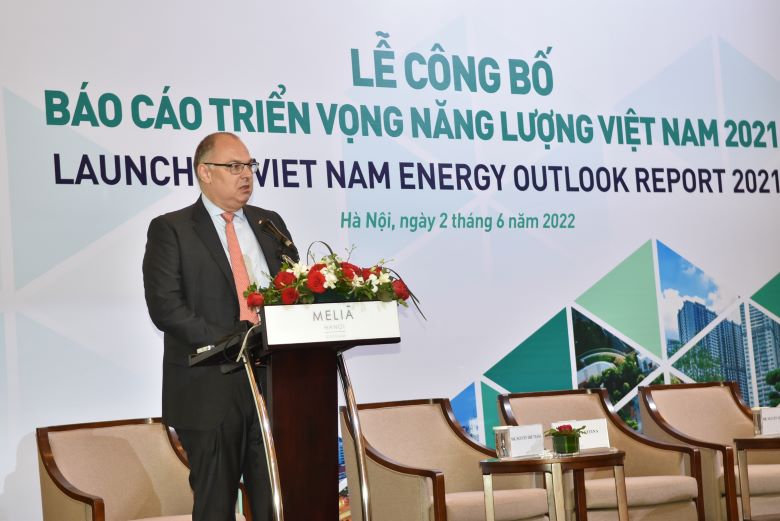Affordable financing crucial for Vietnam’s net zero target
Vietnam is estimated to need US$167 billion in annual investments in 2050 for its net-zero scenario.
It’s crucial for Vietnam to get to a net-zero emissions energy system in an affordable financing way by 2050, domestic and Danish experts gave the suggestion at a meeting held in Hanoi on June 2.
| The launch of the Vietnam Energy Outlook Report 2021 (EOR21) in Hanoi on June 2. Photos: Embassy of Denmark in Hanoi |
The green transition of the power system will be very capital-intensive and could require annual investments of up to US$167 billion in 2050 in the net-zero scenario, corresponding to around 11% of the projected national GDP by the year.
Therefore, power system costs will shift towards fewer fuel costs and much more capital investment costs, according to the Vietnam Energy Outlook Report 2021 (EOR21) developed in collaboration between the Danish Energy Agency, the Electricity and Renewable Energy Authority (EREA), and the Danish Embassy in Hanoi.
Capital investment costs are around 50% of total power system costs in 2030 in all scenarios while towards net zero in 2050 it increases to 90% of the total power system costs, said EOR21 that was released on June 2.
The report provides mid- to long-term perspectives on possible development paths for Vietnam’s energy system towards 2050, guides policymakers, and inspires deliberations on a green transition.
Particularly, the EOR21 examines a scenario for Vietnam to reach the net-zero emissions by 2050 and an in-depth study on the green transport sector with a higher share of electrification and a modal shift towards collective means of transport which resulted in a significant reduction of CO2 emissions and air pollution.
It is expected that the report will give concrete inputs to the implementation of Vietnam’s National Power Development Plan No.8 (PDP8), the National Energy Master Plan, the Vietnamese Climate Change Strategy and other governmental plans and strategies.
“The EOR21 provides valuable information about short-term and long-term energy and power system development, in conformity with the Vietnamese Government’s direction for sustainable energy development along with environmental protection and energy security,” Dang Hoang An, Deputy Minister of Vietnam’s Ministry of Industry and Trade, said at the report launch.
Kristoffer Böttzauw, Director General of DEA, said with EOR21 developed in close collaboration with the Vietnamese Energy Authorities, Danish experts aim to display how this target can be reached in time and at the lowest cost possible to the benefit of the country, its people and, not least, the global climate.”
| Vietnam's Deputy Minister of Industry and Trade Dang Hoang An speaks at the event. |
Guidelines for Vietnam’s net-zero emissions
According to Böttzauw, Vietnam has already come a long way with its green transition, which Prime Minister Pham Minh Chinh’s net-zero pledge at COP26 in Glasgow illustrates.
The report shows some key findings and recommendations, including the main role of renewable electricity in substituting for fossil fuels through the production of electro-fuels (the primary sources of renewable energy-based power production are solar (75%) and wind (21%); the importance of cheap financial sources; no new coal-fired power plants and refurbishing existing plants while limiting the expansion of gas and LNG-fired power plants. It also highlights the central role of storage systems, the possibility and effectiveness of nuclear power in the combination of solar, wind, storage, and transmission, the need of decarbonizing the transport sector, and the necessity of fuel import dependency.
Ambassador of Denmark to Vietnam Kim Højlund Christensen said: “We are happy to share with our local counterparts solid and well-proven Danish solutions, know-how and best practices gained during the past 30 years to support Vietnam in realizing its great potential for green transformation and the country’s commitment to combat climate change and achieve net-zero by 2050 in the most efficient and just way."
In 2013, Vietnam and Denmark entered a long-term cooperation agreement with the purpose of promoting a transition in Vietnam to a low-carbon economy. Efforts to this end are financed by Denmark and administered by the Danish Energy Agency.
| Ambassador of Denmark to Vietnam Kim Højlund Christensen at the event. |












